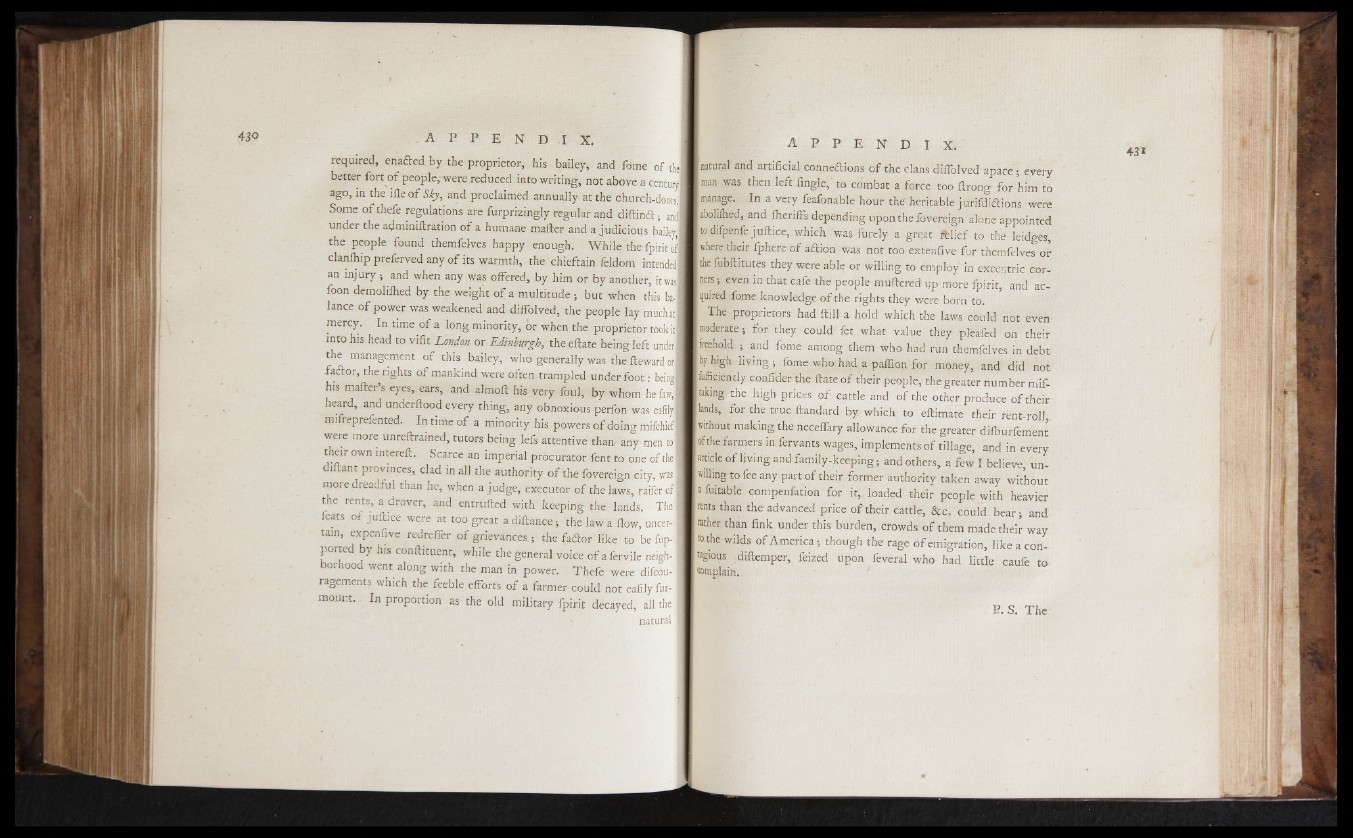
required, enailed by the proprietor, his bailey, and Ibme of the
better fort o f people,-were reduced into writing, not above a century
ago, in the lfleof Sky, and proclaimed annually at the church-doors;!
Some of thefe regulations are furprizingly regular and diftinft | and!
under the adminiftration of a humane mailer and a judicious bailey
the people found themfelves happy enough. While the fpirit of
clanihip preferved any of its warmth, the chieftain feldom iniendedi
an injury ; and when any was offered, by him or by another,' it was!
foon demoliihed by the weight of a multitude ; but when this ba-J
lance of power was weakened and diffolved, the people lay muchat!
mercy. In time of a long minority, or when the proprietor took it«
into his head to vifit London or Edinburgh, the eftate being left under«
the management of this bailey, who generally was the ileward or I
faftor, the rights of mankind were often-trampled underfoot: beingll
his mailer's eyes, ears, and almoit his very foul, by whom he faw,«
heard, and underilood every thing, any obnoxious perfon was eafilyjj
mifreprefented. In time of a minprity his powers of doing mifchief«
were more unreilrained, tutors being lefs attentive than- any men to]
their own intereil. Scarce an imperial procurator fent to one of the]
diftant provinces, clad in all the authority of the fovereign city, was!
more dreadful than he, when a judge, executor of the laws, r a if e r o f l
the rents, a drover, and entruiled with keeping the- lands. The«
feats of juilice were at too great a diftance; the law a flow, uncer-1
tain, expenfive redreffer of grievances,; the fadlor like to be fup-1
ported by his conilituent, while the general voice of a fervile neigh-1
borhood went along with the man in power. Thefe were difcou-1
ragements which the feeble efforts of a farmer could not eafily fur- '
mount. In proportion as the old military fpirit decayed, all the
natural
natural and artificial conneftions of the clans diffolved apace; every
man was then left fingle, to combat a force too ilrong- for him to
manage. In a very feafonable hour the' heritable jurifdidlions were
aboliihed, and Iheriffs depending upon the fovereign alone appointed
to difpenle j uitice, which was furely a great ffelief to the leidges,
where their fphere of adtion was not too extenfive for themfelves or
the fubftitutes they were able or willing to employ in excentric corners
; even in that cafe the people muitered up more fpirit,- and acquired
fome knowledge o f the rights they were born to.
The proprietors had itill a hold which the laws could not even>
moderate; for they could fet what value- they pleafed on their
freehold ; and fome among them who had run themfelves in debt
by high living ; fome who had a paffion for money,, and did not
fufficiently. conffder the ftateof their people, the greater number mif-
taking the high prices o f cattle and of the other produce of their
lands,, for the true ftandard by which to eilimate their rent-roll,,
without making the neceffary allowance for the greater dilburfement
of the farmers in fervants wages, implements of tillage, and in every
article of. living and family-keeping£■ and others, a few I believe,' unwilling
to fee any part of their former authority taken away without
a fuitable compenfation for it, loaded their people with heavier
rents than the'advanced price of their cattle, &c. could bear; and-
rather than fink under this burden,,crowds of them made their way
to the wilds of America; though the rage of emigration, like a contagious
diilemper, feized upon feveral who had little caufe to-
aomplain.
P. S. The